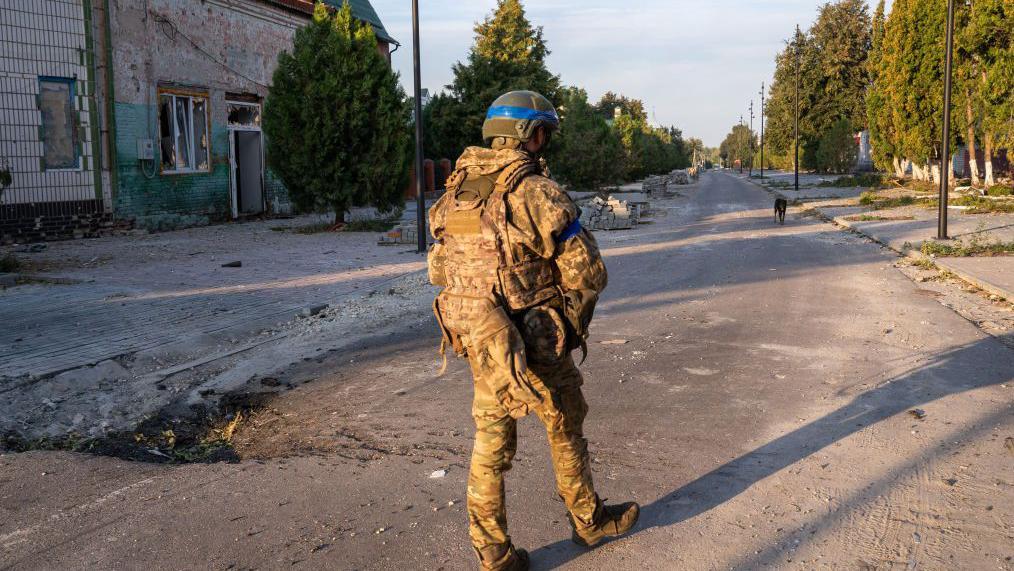Ukraine’s human rights ombudsman, Dmytro Lubinets, has raised alarms regarding the alleged execution of nine Ukrainian soldiers by Russian forces in the Kursk region. He reported these disturbing claims to the United Nations and the International Red Cross, asserting that such actions violate international laws governing warfare. This allegation is supported by a report from Ukrainian human rights group DeepState, which released drone footage purportedly showcasing these deceased troops, identified as drone operators. The unsettling images show the soldiers stripped to their underwear and lying face down in a field, although the authenticity of the footage has yet to be independently verified by the BBC. As of now, there has been no official response from Russian authorities regarding these serious claims.
The context surrounding these allegations suggests that Ukraine has intensified operations along the Russian border since initiating an unexpected incursion earlier in the summer. The footage released by DeepState indicates the troops may have been overwhelmed during a rapid advance by Russian forces. Lubinets stressed that such conduct should not go unpunished, urging the international community to recognize and respond to these breaches of warfare conduct. He emphasized the importance of accountability for these actions, framing them as direct violations of the Geneva Convention, particularly regarding the treatment of captured soldiers.
Accusations of Russian troops executing captured Ukrainian soldiers are not new. The Ukrainian prosecutor’s office recently reported that 93 Ukrainian soldiers had allegedly been executed by Russian forces since the onset of the conflict. Reports emerged of a significant incident near Pokrovsk in the Donetsk region, where officials are investigating claims of the execution of 16 Ukrainian soldiers. If confirmed, this event would represent one of the largest mass executions of Ukrainian POWs since Russia’s invasion began in February 2022. Meanwhile, the Kremlin has consistently denied any wrongdoing by its military personnel in Ukraine, rejecting claims of war crimes.
As the conflict escalates, Russian forces continue their offensive actions in the Kursk region. Ukrainian President Volodymyr Zelensky addressed these developments in his recent comments, reaffirming that Ukrainian troops have effectively countered Russian offensives in that area. Analysts suggest that Ukraine’s military operations aim to compel Russia to divert some of its forces from their eastern Ukraine offensive. The Institute for the Study of War (ISW) reported a significant increase in Russian troop presence in Kursk, estimating around 40,000 troops compared to a previous count of 11,000 when Ukrainian forces first crossed into that territory.
Despite Ukraine’s efforts to push back, the offensive seems to have had little impact on halting Russian advances in the eastern Donbas region. President Zelensky acknowledged the dire circumstances his troops face, noting the intensity of enemy actions in both Donetsk and Zaporizhzhia. The situation in Pokrovsk remains critical, as Russian forces recently claimed control over the village of Mykhailivka, a strategic location that aids in access to vital supply routes. Experts warn that should Russian forces capture Pokrovsk, it could severely compromise Ukraine’s ability to resupply its forces in other key areas, further exacerbating the challenges faced by the Ukrainian military.
At the same time, air assaults by Russian forces on Ukrainian territories persist, with recent reports indicating a barrage that included 68 drones and four missiles aimed at Ukraine. The ongoing conflict showcases an alarming intensity, as both sides grapple with escalating hostilities. Ukraine’s resilience in the face of these attacks, coupled with the global call for accountability regarding alleged war crimes, continues to shape the narrative surrounding the conflict. As the situation unfolds, the impact on civilians and military personnel remains a pressing concern, calling for a broader international response to uphold human rights and the principles of wartime conduct amidst the turmoil.

